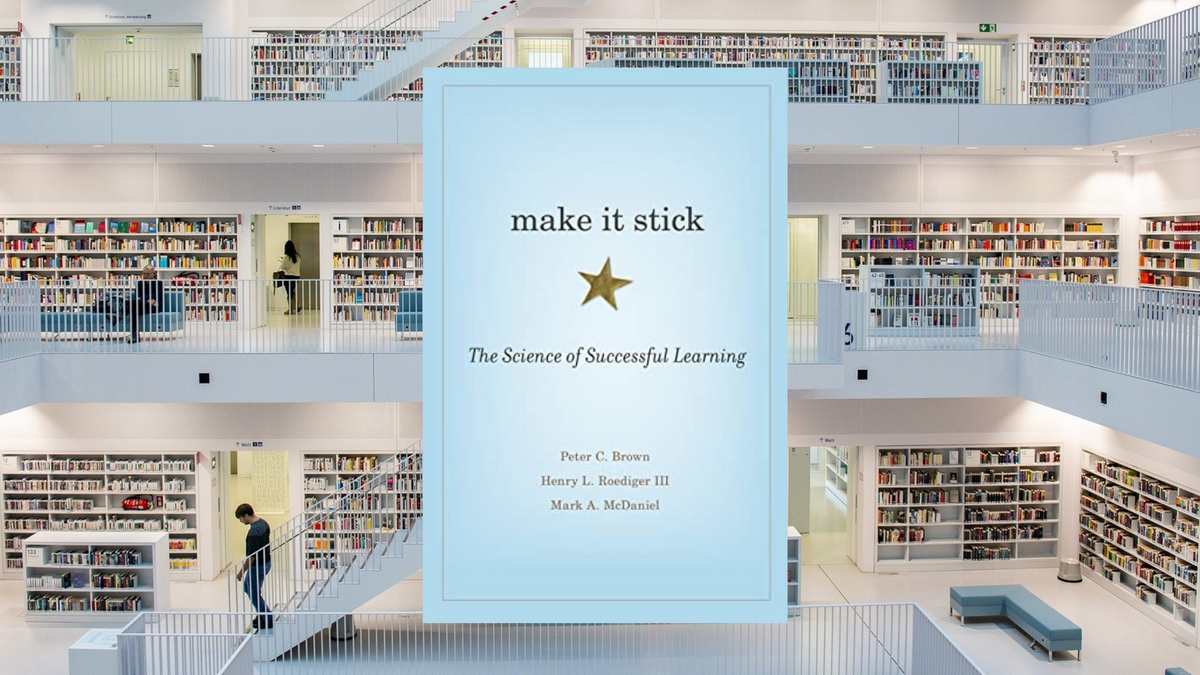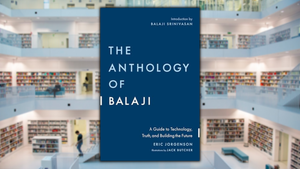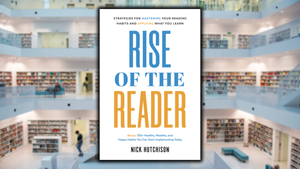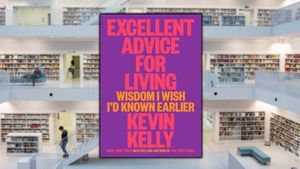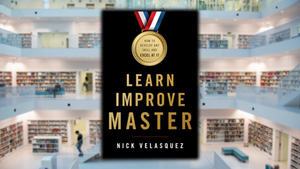
This Book is For:
*Ambitious students who want to gain a distinct competitive advantage in the modern academic environment, or those students who simply want to pass all their exams with flying colors and with much less time spent studying.
*Passionate, dedicated teachers who wish to bring the latest science and most up-to-date pedagogical techniques into their classrooms and lecture halls, thereby maximizing the probability of success of the students entrusted to their care.
*Lifelong learners who want to gain mastery, or at least make astounding progress, in a new pursuit or activity as quickly as possible, and in the most efficient way possible too.
Summary:
“It comes down to the simple but no less profound truth that effortful learning changes the brain, building new connections and capability. This single fact - that our intellectual abilities are not fixed from birth but are, to a considerable degree, ours to shape - is a resounding answer to the nagging voice that too often asks us, 'Why bother?'
We make the effort because the effort itself extends the boundaries of our abilities. What we do shapes who we become and what we're capable of doing. The more we do, the more we can do."
-Make It Stick
Everything you want in life is on the other side of effort and sacrifice. In life, we appreciate what we worked hardest for, and in education, we remember what we struggled to learn.
That's one of the core messages in Make It Stick, which represents the gold standard when it comes to books about effective study strategies and efficient learning.
It's also one of the only scholarly books on learning to contain the word "motherf*****," but it's only used in the context of one of many spectacular examples of learning in action that makes this book so special!
Basically, we remember the information that we recall to mind most frequently, and the more effortful it is to do so, the more entrenched it becomes in our minds and the less likely we are to forget it when we need to use it.
This is known as a "desirable difficulty," which is one of many counterintuitive ideas you'll encounter across the landscape of the science of successful learning. It means that instead of making learning easier, we need to make learning harder if we want it to stick.
Even though this is true, well-meaning teachers and educators all over the world persist in perpetuating the use of ineffective and inefficient study strategies that they think are working but are actually next to useless. The science is ahead of the application in most cases, but if you read Make It Stick, you'll have a major competitive advantage over most people.
Something like 80 percent of all students (in some surveys) say that their primary study strategy is rereading their textbooks and highlighted notes, which is actually one of the least effective study strategies out there. And don't even get the authors started on "learning styles" theory!
The fact is that the more your brain has to work, the deeper it will entrench new learning and the more likely you will be able to recall it when you need it.
As we'll explore later on, there are several illusions of knowing that make it seem as though learning has taken place when it really hasn't. And there are far more effective things you can be doing to study and improve than cramming, rereading, highlighting, or practicing the same move over and over and over again.
At the end of the day, the universe rewards effort, exertion, and striving. We need to go beyond what we think we can do if we want to find out how far we can really go.
This same theme - the hardest path usually being the best - shows up again and again in life, and Make It Stick will show you how applying that wisdom to your studying and your practicing will allow you to reach levels of mastery that are simply unavailable to people who aren't familiar with the science of successful learning.
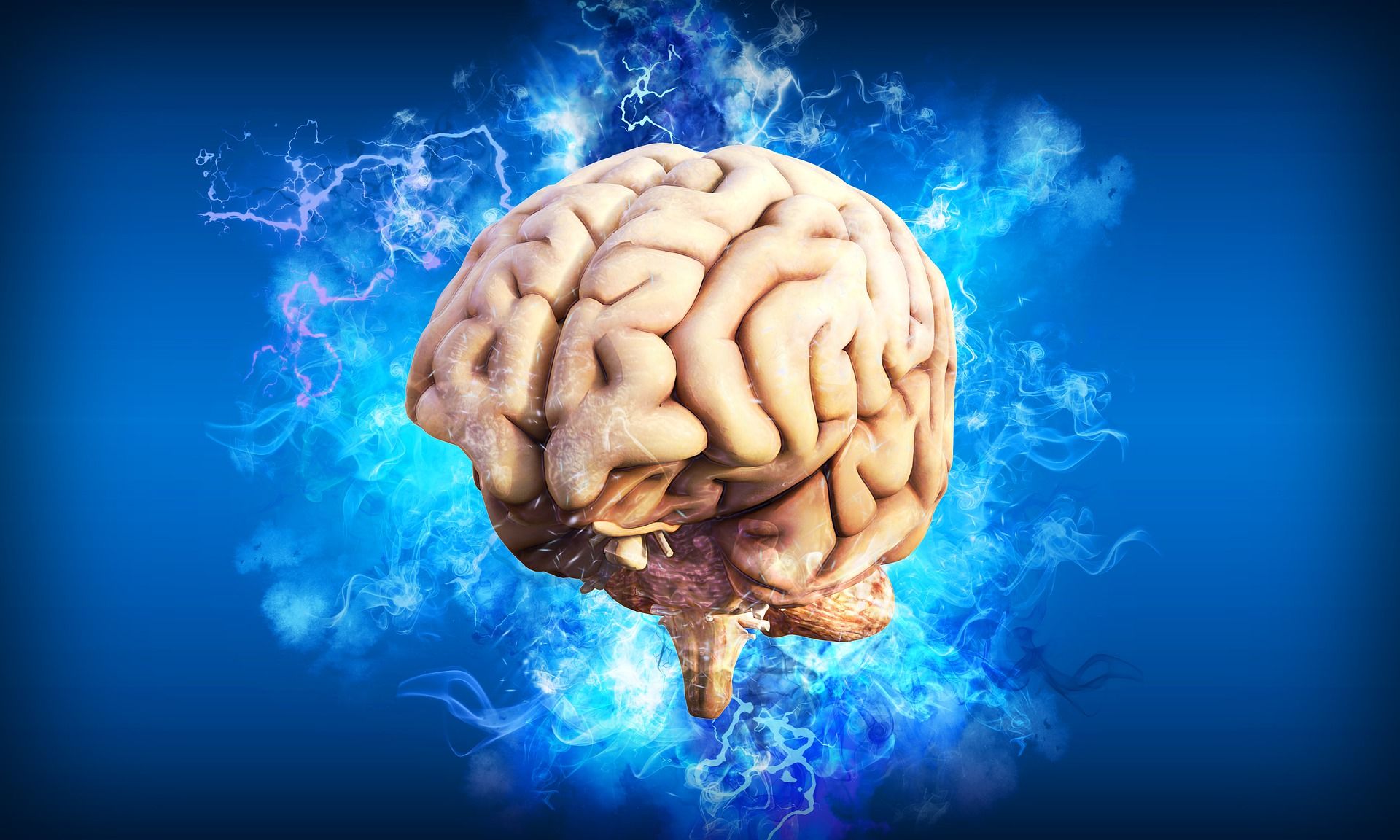
Key Ideas:
#1: We Are Only Beginning to Understand What the Human Brain Can Do
“We have been raised to think that the brain is hardwired and our intellectual potential is more or less set from birth. We now know otherwise.
Average IQs have risen over the past century with changes in living conditions. When people suffer brain damage from strokes or accidents, scientists have seen the brain somehow reassign duties so that adjacent networks of neurons take over the work of damaged areas, enabling people to regain lost capacities.
Competitions between 'memory athletes' like James Paterson and Nelson Dellis have emerged as an international sport among people who have trained themselves to perform astonishing acts of recall.
Expert performance in medicine, science, music, chess, or sports has been shown to be the product not just of innate gifts, as had long been thought, but of skills laid down layer by layer, through thousands of hours of dedicated practice.
In short, research and the modern record have shown that we and our brains are capable of much greater feats than scientists would have thought possible even a few decades ago."
At the turn of the 20th century, numerous intelligent and knowledgeable people actually claimed that all conceivable human progress had already been made. And that was before the age of computers, microchips, biomedicine...even before Amazon Prime! Human beings are notoriously bad at guessing where our limits actually lie.
Perhaps the gains we can make in intelligence, learning, and academic achievement aren't infinite, but they're certainly larger than most people believe. We simply don't know the endpoint, the final limit, of human mental and physical achievement.
The first step toward reaching and expanding those limits is the most important: realizing that the possibility exists, and realizing that if we put in the work, we are capable of so much more than perhaps we've ever given ourselves credit for.
If you want to learn more about how we've made such astounding progress over the last few centuries in the areas of well-being and human potential, the book breakdowns for Enlightenment Now, by Steven Pinker, and Progress, by Johan Norberg are two excellent places to start.
#2: Most Students Today Are Studying Incorrectly (Or at Least Inefficiently)
“Rereading text and massed practice of a skill or new knowledge are by far the preferred study strategies of learners of all stripes, but they're also among the least productive.
By massed practice, we mean the single-minded, rapid-fire repetition of something you're trying to burn into memory, the 'practice-practice-practice' of conventional wisdom. Cramming for exams is an example.
Rereading and massed practice give rise to feelings of fluency that are taken to be signs of mastery, but for true mastery or durability these strategies are largely a waste of time."
In some surveys, more than 80 percent of students reported that their number one study strategy was the practice of rereading their textbooks, even though this is perhaps one of the least effective study strategies ever devised.
Students persist in this inefficient and ineffective way because rereading feels like it should work. It feels as though they are learning when they're actually not - or at least not as well as they could be learning if they switched to some of the more effective strategies outlined in Make It Stick.
Several illusions of knowing explain why these ineffective strategies seem to work. The first is that we mistake material that we're familiar with for material that we actually know. We recognize it, but if we didn't have our notes right in front of us, we couldn't reproduce that knowledge on a test or in the field.
The other illusion has to do with how easily we reread text or repeat a certain movement. Once we've read something several times, we can probably skim through it pretty fast and feel as though we've actually learned it, but that isn't necessarily true.
The takeaway is to ditch the practice of spending (wasting) long hours rereading, cramming, and highlighting, and instead practice some of the science-backed study techniques we'll cover later in this breakdown.
#3: How Learning Really Works
“Learning is at least a three-step process: initial encoding of information is held in short-term working memory before being consolidated into a cohesive representation of knowledge in long-term memory. Consolidation reorganizes and stabilizes memory traces, gives them meaning, and makes connections to past experiences and to other knowledge already stored in long-term memory. Retrieval updates learning and enables you to apply it when you need it."
The first step in the learning process (as it happens in the brain) is the encoding of new information as it is held in short-term memory immediately after being exposed to it. This is the span of time where new learning is in the greatest danger of being lost. It's so fresh and new that a lot can go wrong during the encoding process.
However, with effective study, new knowledge is consolidated into long-term memory where the goal is to make it "stickier." The consolidation process stabilizes new learning, associating it with knowledge and information you already have and ensuring that it becomes entrenched. More on this process later.
The third step is then retrieval - which is a huge theme in this book - where you periodically recall knowledge and learning and where you interrupt the forgetting process.
"Knowing" something is pretty useless if you can't find that knowledge and apply it when and where you need it, so a big part of retrieval is ensuring that you also have ready access to your new learning in the situations that call for it.
#4: Two Essential Keys to Effective Learning
“Durable, robust learning requires that we do two things. First, as we recode and consolidate new material from short-term memory into long-term memory, we must anchor it there securely.
Second, we must associate the material with a diverse set of cues that will make us adept at recalling the knowledge later. Having effective retrieval cues is an aspect of learning that often goes overlooked. The task is more than committing knowledge to memory. Being able to retrieve it when we need it is just as important."
We talked about this in Key Idea #3 above, but a major priority when learning anything new that we want to recall later is securing it in our long-term memory. That's always the goal; we must never lose sight of that.
But also, and just as important, is that we need to be able to get to it later. That's an entirely different skill set, and it's done by creating a series of cues and associations between what we've just learned and what we already know.
In exactly the same way as passing by a bag of chips can trigger your craving for those chips, a strong cue makes you remember something that you want to remember. See the chips, want the chips. See the right hook coming, put your left hand up to block it. Same thing.
Associations work in a similar way in that something new that you've learned is connected to something you already know. For example, your background knowledge of 20th-century British history can help you understand some of the nuances of Oscar Wilde's The Picture of Dorian Gray.
The key is to be able to call up your new learning when you need it, as we've discussed. Right now, it's crucial to note that these processes take time and that learning doesn't just happen when viewing new material for the first time.
You need to make sure you're getting adequate sleep, staying hydrated, testing yourself, trying to recall knowledge from memory later, etc. As the authors explain:
“It appears that embedding new learning in long-term memory requires a process of consolidation, in which memory traces (the brain's representations of new learning) are strengthened, given meaning, and connected to prior knowledge - a process that unfolds over hours and may take several days."
#5: Learning is Unlimited (But There's a Catch)
“There’s virtually no limit to how much learning we can remember as long as we relate it to what we already know. In fact, because new learning depends on prior learning, the more we learn, the more possible connections we create for further learning.
Our retrieval capacity, though, is severely limited. Most of what we've learned is not accessible to us at any given moment. This limitation on retrieval is helpful to us: if every memory were always readily to hand, you would have a hard time sorting through the sheer volume of material to put your finger on the knowledge you need at the moment."
There are more connections in the human brain than there are stars in our Milky Way galaxy; as for individual neurons, we each have about 100,000,000,000 of them. Thus, you'll never be able to say, "I'm sorry, I can't learn any more. My brain is full!"
Despite Homer Simpson's protestations that taking that home wine-making course caused him to forget how to drive (he was drunk), learning something new doesn't automatically push something else out of your brain. We can always learn more.
The catch is that we can't always access it any time we want. However, the authors of Make It Stick make the case that if we did possess such an ability, it would be mayhem.
Every single thing that we know or had ever learned would constantly be pushing and struggling to get to the front of our conscious awareness and we'd never be able to pick out that one specific thing we need to remember right now so that we could use it in this particular situation.
Sometimes, the brain is smarter than we are (if that makes sense!), and over the course of evolution, we've been endowed with the ability to recall appropriate knowledge and information through a system of cues, associations, and triggers, which makes us much more efficient.
The takeaway? Never stop learning! Your brain can handle it, and in order to make this process more efficient, we can learn to execute some of the advanced learning strategies explained here in this breakdown..
#6: Practice Retrieving Knowledge from Memory
“The act of retrieving learning from memory has two profound benefits. One, it tells you what you know and don't know, and therefore where to focus further study to improve the areas where you're weak.
Two, recalling what you have learned causes your brain to reconsolidate the memory, which strengthens its connections to what you already know and makes it easier to recall in the future. In effect, retrieval - testing - interrupts forgetting."
Retrieval practice (sometimes called forced recall) is one of the most important ideas in the entire book and it's basically the foundation of all learning. Yes, it's that important, and it is something you must do if you want to learn anything more effectively and efficiently.
The idea is a very simple one: you remember what you recall to mind most frequently.
Additionally, however, the more effortful it is for you to recall something, the stronger it becomes installed in your mind for later use. In life, we appreciate what we worked hardest for, and in education, we remember what we struggled to learn. If you take just one thing away from this breakdown, make it that.
But another benefit that retrieval practice has is that it allows us to see what we haven't learned as well, and then take steps to remember it better. If we try to recall something without looking at our notes and find that we can't, then that's a clue that we need to go back and study that particular information more closely and then test ourselves on it again.
While most students will be wasting time rereading their textbooks and studying the same things repeatedly in the same sequence, you'll be studying smarter. Most importantly, you'll be taking active steps to interrupt the forgetting process, as the authors explain here:
“In very short order we lose something like 70 percent of what we've just heard or read. After that, forgetting begins to slow, and the last 30 percent or so falls away more slowly, but the lesson is clear: a central challenge to improving the way we learn is finding a way to interrupt the process of forgetting."
#7: Practice Spaced Repetition
“When practice is spaced, interleaved, and varied, it requires more effort. You feel the increased effort, but not the benefits the effort produces. Learning feels slower from this kind of practice, and you don't get the rapid improvements and affirmations you're accustomed to seeing from massed practice."
Spaced repetition has earned its place as one of the most effective study strategies of all time, and it's closely related to retrieval. The basic idea is that you allow some time to pass before testing yourself on the material you've just learned.
Critical to this process is the fact that, as more time elapses between study sessions, you're going to experience some inevitable forgetting of the material you've been studying. This is normal, and you can actually use this to your advantage.
When learning is more effortful - when it's harder to recall what you've learned, because the process of forgetting has set in - new knowledge becomes anchored more securely in your long-term memory.
So you want to experience a little bit of forgetting so that you create some desirable difficulty in your studying which will cause you to learn even better. Again, this is all counterintuitive stuff that doesn't feel like it's working in the moment, but it is!
You also want to practice interleaving and vary your practice so that you're not repeating everything in the same order every time. If massed practice is hitting 100 fastballs in a row before moving on to hitting 100 curveballs in a row, varied practice means switching up the pitches and keeping yourself alert so that you never know what's coming next.
Interleaving is done by studying, say, English Literature, and then putting those textbooks away for a while and then picking up your Mathematics textbooks, before switching again to Geography, then back to English, then to Chemistry, etc.
As we've discussed before, the fact that it's harder to do is good; if you feel as though it's all coming easy and you recognize all the material without putting forth much effort in recalling it, then it may be a sign that you're falling victim to one of the illusions of knowing from Key Idea #2.
It's similar to the fact that at the gym if you're not constantly challenging yourself with heavier and heavier weights, your muscles aren't going to grow. When studying is easy, it's a sign that the weights aren't heavy enough.
#8: Practice Reflection to Consolidate New Learning
“Reflection can involve several cognitive activities we have discussed that lead to stronger learning. These include retrieval (recalling recently learned knowledge to mind), elaboration (for example, connecting new knowledge to what you already know), and generation (for example, rephrasing key ideas in your own words or visualizing and mentally rehearsing what you might do differently next time)."
The most advanced students are active participants in the subjects that they're learning about, and a big part of that is making reflection part of their regular practice.
By reflection, the authors mean any activity that involves the student taking a step back from the prepared material, and making it their own. Retrieval is certainly part of it, but elaboration is critically important too (Key Idea #9), as well as putting new knowledge in your own words and thereby making it more relevant to you and less likely to fade quickly over time.
Reflection isn't just applicable to more intellectual pursuits either. It's also incredibly valuable in the context of evaluating any prior performance, running through what happened, and rehearsing your next steps.
On the football field, in the weight room, at the piano, elite performers everywhere are constantly reflecting on what went well, what could have gone better, and how they will respond to specific situations in the future.
#9: Practice Elaboration for Even Stronger Learning
“How ably you can explain a text is an excellent cue for judging comprehension, because you must recall the salient points from memory, put them into your own words, and explain why they are significant - how they relate to the larger subject."
When you teach something, you get to learn it twice. Even writing this breakdown is helping to consolidate the information from Make It Stick inside my brain, and I also make it a practice to write and speak about every book that I finish. One of the best ways to learn anything is to teach it to someone else.
That's what elaboration involves, and to do it effectively you need to take whatever it is that you've been learning, make it relevant and "sticky" to you by putting it into your own words, and then externalize your knowledge by sharing with others.
#10: Children Should Be Tested More, Not Less
“Students who have been quizzed have a double advantage over those who have not: a more accurate sense of what they know and don't know, and the strengthening of learning that accrues from retrieval practice."
At the classroom level, students would benefit immensely from receiving additional quizzes to test their current knowledge.
It's the same for the whole class as it is for the individual: they will strengthen and solidify their learning and expose their own weaknesses so they know where they need to place additional attention while studying.
As the authors explain in the quote below, quizzes don't have to make up a significant portion of the students' total grades in order to be effective study tools. It can also bring together an entire semester's worth of knowledge and insight:
“Most important is to make frequent use of testing and retrieval practice to verify what you really do know versus what you think you know.
Frequent low-stakes quizzes in class help the instructor verify that students are in fact learning as well as they appear to be and reveal the areas where extra attention is needed.
Doing cumulative quizzing is especially powerful for consolidating learning and knitting the concepts from one stage of a course into new material encountered later."

Book Notes:
“Memory is the mother of all wisdom.”
-Aeschylus
“If you’re good at learning, you have an advantage in life.”
“We are poor judges of when we are learning well and when we are not. When the going is harder and slower and it doesn't feel productive, we are drawn to strategies that feel more fruitful, unaware that the gains from these strategies are often temporary."
“Retrieval practice - recalling facts or concepts or events from memory - is a more effective learning strategy than review by rereading. Flashcards are a simple example. Retrieval strengthens the memory and interrupts forgetting. A single, simple quiz after reading a text or hearing a lecture produces better learning and remembering than rereading the text or reviewing lecture notes.
While the brain is not a muscle that gets stronger with exercise, the neural pathways that make up a body of learning do get stronger, when the memory is retrieved and the learning is practiced. Periodic practice arrests forgetting, strengthens retrieval routes, and is essential for hanging onto the knowledge you want to gain."
“Retrieval practice that you perform at different times and in different contexts and that interleaves different learning material has the benefit of linking new associations to the material. This process builds interconnected networks of knowledge that bolster and support mastery of your field. It also multiplies the cues for retrieving the knowledge, increasing the versatility with which you can later apply it."
"When you space out practice at a task and get a little rusty between sessions, or you interleave the practice of two or more subjects, retrieval is harder and feels less productive, but the effort produces longer lasting learning and enables more versatile application of it in later settings."
“Trying to solve a problem before being taught the solution leads to better learning, even when errors are made in the attempt."
“If you practice elaboration, there's no known limit to how much you can learn. Elaboration is the process of giving new material meaning by expressing it in your own words and connecting it with what you already know.
The more you can explain about the way your new learning relates to your prior knowledge, the stronger your grasp of the new learning will be, and the more connections you create that will help you remember it later."
“People who learn to extract the key ideas from new material and organize them into a mental model and connect that model to prior knowledge show an advantage in learning complex mastery."
“Many people believe that their intellectual ability is hardwired from birth, and that failure to meet a learning challenge is an indictment of their native ability. But every time you learn something new, you change the brain - the residue of your experiences is stored.
It's true that we start life with the gift of our genes, but it's also true that we become capable through the learning and development of mental models that enable us to reason, solve, and create.
In other words, the elements that shape your intellectual abilities lie to a surprising extent within your own control.
Understanding that this is so enables you to see failure as a badge of effort and a source of useful information - the need to dig deeper or to try a different strategy. The need to understand that when learning is hard, you're doing important work."
“What’s the conclusion? It makes sense to reread a text once if there's been a meaningful lapse of time since the first reading, but doing multiple readings in close succession is a time-consuming study strategy that yields negligible benefits at the expense of much more effective strategies that take less time."
“How did he study for the test? she asks. Well, he'd gone back and highlighted his notes, and then reviewed the highlighted notes and his highlighted text material several times until he felt he was thoroughly familiar with all of it. How could it be that he had pulled a D on the exam?
Had he used the set of key concepts at the back of each chapter to test himself? Could he look at a concept like 'conditioned stimulus,' define it, and use it in a paragraph? While he was reading, had he thought of converting the main points of the text into a series of questions and then later tried to answer them while he was studying? Had he at least rephrased the main ideas in his own words as he read? Had he tried to relate them to what he already knew? Had he looked for examples outside the text?
The answer was no in every case. He sees himself as the model student, diligent to a fault, but the truth is he doesn't know how to study effectively."
“Giving feedback strengthens retention more than testing alone does, and, interestingly, some evidence shows that delaying the feedback briefly produces better long-term learning than immediate feedback."
“After an initial test, delaying subsequent retrieval practice is more potent for reinforcing retention than immediate practice, because delayed retrieval requires more effort."
“Repeated retrieval not only makes memories more durable but produces knowledge that can be retrieved more readily, in more varied settings, and applied to a wider variety of problems."
“For Coach Dooley's team, it's all there: retrieval, spacing, interleaving, variation, reflection, and elaboration. The seasoned quarterback going into Saturday's game - mentally running through the plays, the reactions, the adjustments - is doing the same thing as the seasoned neurosurgeon who's rehearsing what's about to unfold in the operating room."
“The time periods between sessions of practice let memories consolidate. Sleep seems to play a large role in memory consolidation, so practice with at least a day in between sessions is good."
“Interleaving can also help you develop your ability to discriminate later between different kinds of problems and select the right tool from your growing toolkit of solutions. In interleaving, you don't move from a complete practice set of one topic to go to another. You switch before each practice is complete."
“Like interleaving, varied practice helps learners build a broad schema, an ability to assess changing conditions and adjust responses to fit."
“Problems and opportunities come at us unpredictably, out of sequence. For our learning to have practical value, we must be adept at discerning 'What kind of problem is this?' so we can select and apply an appropriate solution."
“Reflection is a form of retrieval practice (What happened? What did I do? How did it work out?), enhanced with elaboration (What would I do differently next time?)."
“New learning is labile: its meaning is not fully formed and therefore is easily altered. In consolidation, the brain reorganizes and stabilizes the memory traces.
This may occur over several hours or longer and involves deep processing of the new material, during which scientists believe that the brain replays or rehearses the learning, giving it meaning, filling in blank spots, and making connections to past experiences and to other knowledge already stored in long-term memory.
Prior knowledge is a prerequisite for making sense of new learning, and forming those connections is an important task of consolidation."
“An apt analogy for how the brain consolidates new learning may be the experience of composing an essay.
The first draft is rangy, imprecise. You discover what you want to say by trying to write it. After a couple of revisions, you have sharpened the piece and cut away some of the extraneous points. You put it aside to let it ferment. When you pick it up again a day or two later, what you want to say has become clearer in your mind. Perhaps you now perceive that there are three main points you are making. You connect them to examples and supporting information familiar to your audience. You rearrange and draw together the elements of your argument to make it more effective and elegant.
Similarly, the process of learning something often starts out feeling disorganized and unwieldy; the most important aspects are not always salient. Consolidation helps organize and solidify learning, and, notably, so does retrieval after a lapse of some time, because the act of retrieving a memory from long-term storage can both strengthen the memory traces and at the same time make them modifiable again, enabling them, for example, to connect to more recent learning. This process is called reconsolidation. This is how retrieval practice modifies and strengthens learning."
“It is a critical point that as you learn new things, you don't lose from long-term memory most of what you have learned well in life; rather, through disuse or the reassignment of cues, you forget it in the sense that you're unable to call it up easily.
For example, if you've moved several times, you may not be able to recall a previous address from twenty years ago. But if you are given a multiple choice test for the address, you can probably pick it out easily, for it still abides, as it were, in the uncleaned closet of your mind.
If you have ever immersed yourself in writing stories of your past, picturing the people and places of earlier days, you may have been surprised by the memories that started flooding back, things long forgotten now coming to mind. Context can unleash memories, as when the right key works to open an old lock."
“It’s better to solve a problem than memorize a solution.”
“Good judgment is a skill one must acquire, becoming an astute observer of one's own thinking and performance. We start at a disadvantage for several reasons.
One is that when we're incompetent, we tend to overestimate our competence and see little reason to change. Another is that, as humans, we are readily misled by illusions, cognitive biases, and the stories we construct to explain the world around us and our place within it.
To become more competent, or even expert, we must learn to recognize competence when we see it in others, become more accurate judges of what we ourselves know and don't know, adopt learning strategies that get results, and find objective ways to track our progress."
“Learning when to trust your intuition and when to question it is a big part of how you improve your competence in the world at large and in any field where you want to be an expert."
“The discomfort with ambiguity and arbitrariness is equally powerful, or more so, in our need for a rational understanding of our own lives. We strive to fit the events of our lives into a cohesive story that accounts for our circumstances, the things that befall us, and the choices we make.
Each of us has a different narrative that has many threads woven into it from our shared culture and experience of being human, as well as many distinct threads that explain the singular events of one's personal past.
All these experiences influence what comes to mind in a current situation and the narrative through which you make sense of it."
“It is a confounding paradox, then, that the changeable nature of our memory not only can skew our perceptions but also is essential to our ability to learn."
“What psychologists call the curse of knowledge is our tendency to underestimate how long it will take another person to learn something new or perform a task that we have already mastered."
“Something you once heard that you hear again later carries a warmth of familiarity that can be mistaken for memory, a shred of something you once knew and cannot quite place but are inclined to believe. In the world of propaganda, this is called "the big lie" technique - even a big lie told repeatedly can come to be accepted as truth."
“Our memories are also subject to social influence and tend to align with the memories of the people around us.
If you are in a group reminiscing about past experiences and someone adds a wrong detail about the story, you will tend to incorporate this detail into your own memory and later remember the experience with the erroneous detail. This process is called 'memory conformity,' or the 'social contagion of memory': one person's error can 'infect' another person's memory.
Of course, social influences are not always bad. If someone recalls details of a joint memory on which you are somewhat hazy, your subsequent memory will be updated and will hold a more accurate record of the past event."
"Humans are predisposed to assume that others share their beliefs, a process called the false consensus effect. We generally fail to recognize the idiosyncratic nature of our personal understanding of the world and interpretation of events and that ours differ from others."
“Action beats reaction every time.”
“Sometimes the most powerful feedback for calibrating your sense of what you do and don't know are the mistakes you make in the field, assuming you survive them and are receptive to the lesson."
“We acknowledge that everyone has learning preferences, but we are not persuaded that you learn better when the manner of instruction fits those preferences."
“Rich people were probably no smarter than he was, they just had knowledge he lacked.”
“People who as a matter of habit extract underlying principles or rules from new experiences are more successful learners than those who take their experiences at face value, failing to infer lessons that can be applied later in similar situations.
Likewise, people who single out salient concepts from the less important information they encounter in new material and who link these key ideas into a mental structure are more successful learners than those who cannot separate the wheat from the chaff and understand how the wheat is made into flour."
“Each of us has a large basket of resources in the form of aptitudes, prior knowledge, intelligence, interests, and sense of personal empowerment that shape how we learn and how we overcome our shortcomings.
Some of these differences matter a lot - for example, our ability to abstract underlying principles from new experiences and to convert new knowledge into mental structures. Other differences we may think count for a lot, for example having a verbal or visual learning style, actually don't."
“On any list of differences that matter most for learning, the level of language fluency and reading ability will be at or near the top."
“They found very few studies designed to be capable of testing the validity of learning styles theory in education, and of those, they found that virtually none validate it and several flatly contradict it.
Moreover, their review showed that it is more important that the mode of instruction match the nature of the subject being taught: visual instruction for geometry and geography, verbal instruction for poetry, and so on.
When instructional style matches the nature of the content, all learners learn better, regardless of their differing preferences for how the material is taught."
“Psychologists today generally accept that individuals possess at least two kinds of intelligence. Fluid intelligence is the ability to reason, see relationships, think abstractly, and hold information in mind while working on a problem; crystallized intelligence is one's accumulated knowledge of the world and the procedures or mental models one has developed from past learning and experience. Together, these two kinds of intelligence enable us to learn, reason, and solve problems."
“We're all in a state of developing expertise, and any test that measures only what we know at any given moment is a static measure that tells us nothing about our potential in the realm the test measures."
“Just to predict the speed with which a horse would run the final quarter mile, the experts relied on a complex mental model involving as many as seven variables. The study found that IQ is unrelated to handicapping ability, and 'whatever it is that an IQ test measures, it is not the ability to engage in cognitively complex forms of multivariate reasoning.'"
“All knowledge and memory are physiological phenomena, held in our neurons and neural pathways. The idea that the brain is not hardwired but plastic, mutable, something that reorganizes itself with each new task, is a recent revelation, and we are just at the forefront of understanding what it means and how it works."
“Another fundamental sign of the brain's enduring mutability is the discovery that the hippocampus, where we consolidate learning and memory, is able to generate new neurons throughout life. This phenomenon, called neurogenesis, is thought to play a central role in the brain's ability to recover from physical injury and in humans' lifelong ability to learn.
The relationship of neurogenesis to learning and memory is a new field of inquiry, but already scientists have shown that the activity of associative learning (that is, of learning and remembering the relationship between unrelated items, such as names and faces) stimulates an increase in the creation of new neurons in the hippocampus.
This rise in neurogenesis starts before the new learning activity is undertaken, suggesting the brain's intention to learn, and continues for a period after the learning activity, suggesting that neurogenesis plays a role in the consolidation of memory and the beneficial effects that spaced and effortful retrieval practice have on long-term retention."
“IQ is a product of genes and environment. Compare it to height: it's mostly inherited, but over the decades as nutrition has improved, subsequent generations have grown taller. Likewise, IQs in every industrialized part of the world have shown a sustained rise since the start of standardized sampling in 1932, a phenomenon called the Flynn effect after the political scientist who first brought it to wide attention."
“Richard Nisbett, in his book Intelligence and How to Get It, discusses the pervasiveness of stimuli in modern society that didn't exist years ago, offering as one example a puzzle maze McDonald's included in its Happy Meals a few years ago that was more difficult than the mazes included in an IQ test for gifted children.
Nisbett also writes about 'environmental multipliers,' suggesting that a tall kid who goes out for basketball develops a proficiency in the sport that a shorter kid with the same aptitudes won't develop, just as a curious kid who goes for learning gets smarter than the equally bright but incurious kid who doesn't.
The options for learning have expanded exponentially. It may be a very small genetic difference that makes one kid more curious than another, but the effect is multiplied in an environment where curiosity is easily piqued and readily satisfied."
“When you praise for intelligence, kids get the message that being seen as smart is the name of the game. 'Emphasizing effort gives a child a rare variable they can control,' Dweck says. But 'emphasizing natural intelligence takes it out of a child's control, and it provides no good recipe for responding to a failure.'"
“Imagery serves to contribute vividness and connective links to memory. Humans remember pictures more easily than words. (For example, the image of an elephant is easier to recall than the word 'elephant.') So it stands to reason that associating vivid mental images with verbal or abstract material makes that material easier to retrieve from memory.
A strong mental image can prove as secure and bountiful as a loaded stringer of fish. Tug on it, and a whole day's catch comes to the surface. When a friend is reminding you of a conversation with somebody the two of you met on a trip, you struggle to recall it. She tells you where the discussion happened, and you picture the place. Ah, yes, it all comes flooding back. Images cue memories."
“The versatility of mnemonic devices is almost endless. What they hold in common is a structure of some kind - number scheme, travel route, floor plan, song, poem, aphorism, acronym - that is deeply familiar and whose elements can be easily linked to the target information to be remembered."
“It comes down to the simple but no less profound truth that effortful learning changes the brain, building new connections and capability. This single fact - that our intellectual abilities are not fixed from birth but are, to a considerable degree, ours to shape - is a resounding answer to the nagging voice that too often asks us, 'Why bother?'
We make the effort because the effort itself extends the boundaries of our abilities. What we do shapes who we become and what we're capable of doing. The more we do, the more we can do.
To embrace this principle and reap its benefits is to be sustained through life by a growth mindset. And it comes down to the simple fact that the path to complex mastery or expert performance does not necessarily start from exceptional genes, but it most certainly entails self-discipline, grit, and persistence; with these qualities in healthy measure, if you want to become an expert, you probably can.
And whatever you are striving to master, whether it's a poem you wrote for a friend's birthday, the concept of classical conditioning in psychology, or the second violin part in Hayden's Fifth Symphony, conscious mnemonic devices can help to organize and cue the learning for ready retrieval until sustained, deliberate practice and repeated use form the deeper encoding and subconscious mastery that characterize expert performance."
“Retrieving knowledge and skill from memory should become your primary study strategy in place of rereading."
“The harder it is for you to recall new learning from memory, the greater the benefit of doing so. Making errors will not set you back, so long as you check your answers and correct your mistakes."
“What you don’t sense when you're struggling to retrieve new learning is the fact that every time you work hard to recall a memory, you actually strengthen it. If you restudy something after failing to recall it, you actually learn it better than if you had not tried to recall it. The effort of retrieving knowledge or skills strengthens its staying power and your ability to recall it in the future."
“Anything you want to remember must be periodically recalled from memory.”
“If you’re trying to learn mathematical formulas, study more than one type at a time, so that you are alternating between different problems that call for different solutions. If you are studying biology specimens, Dutch painters, or the principles of macroeconomics, mix up the examples."
"Bloom’s taxonomy classifies cognitive learning on six levels. It was developed in 1956 by a committee of educators chaired by psychologist Benjamin Bloom.
The six levels range from gaining knowledge (the most fundamental level), to developing comprehension of the underlying facts and ideas, being able to apply learning to solve problems, being able to analyze ideas and relationships so as to make inferences, being able to synthesize knowledge and ideas in new ways, and, at the most sophisticated level, being able to use learning to evaluate opinions and ideas and make judgments based on evidence and objective criteria."
“Our brains are like a forest, and your memory is in there somewhere. You're here, and the memory is over there. The more times you make a path to that memory, the better the path is, so that the next time you need the memory, it's going to be easier to find it. But as soon as you get your notes out, you have short-circuited the path. You are not exploring for the path anymore, someone has told you the way."
“We have talked throughout this book about learning, not about education. The responsibility for learning rests with every individual, whereas the responsibility for education (and training, too) rests with the institutions of society.
Education embraces a world of difficult questions. Are we teaching the right things? Do we reach children young enough? How should we measure outcomes? Are our young people mortgaging their futures to pay for a college degree?
These are urgent issues, and we need to wrestle through them. But while we're doing that, the techniques for highly effective learning that are outlined in this book can be put to use right now everywhere learners, teachers, and trainers are at work. They come at no cost, they require no structural reform, and the benefits they promise are both real and long-lasting."

Important Insights from Related Books:
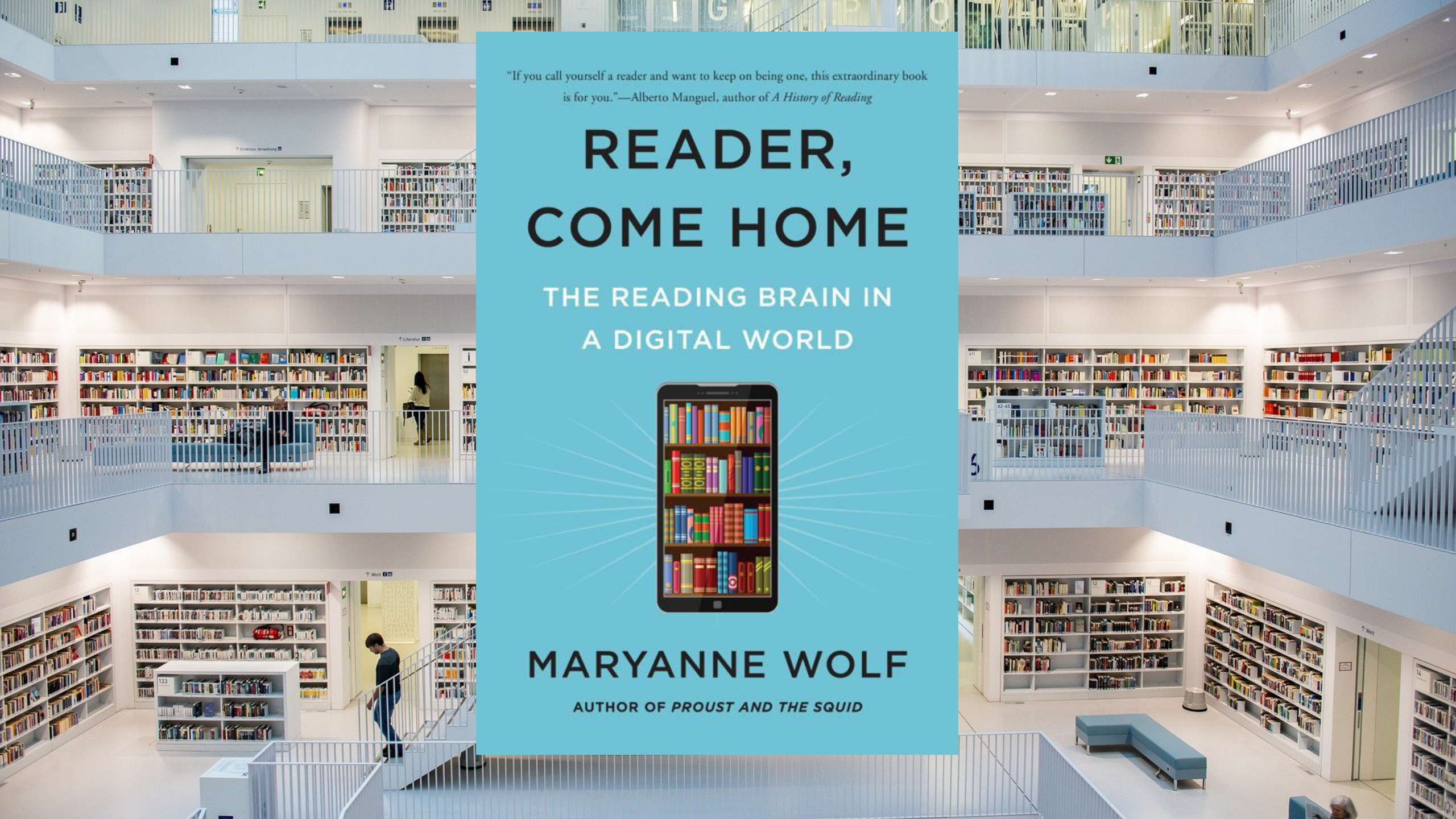
Reader Come Home, by Maryanne Wolf:
Humans were never meant to read. No child is ever born with a gene that directly leads to literacy; the reading circuit has to be intentionally, and rigorously cultivated, especially in the early years, and nothing about that process is guaranteed.
The ability to read these words is nothing short of a miracle, and you're witnessing it right now in this very moment.
The human brain - this amazingly, vastly complex thing, this technology that you carry around in your head all day - somehow finds a way to connect the functions that already exist, like vision, language, pattern recognition, and more, and combines them in such a way that you're able to follow this sentence and decode its meaning.
In this book, Reader, Come Home, neuroscientist Maryanne Wolf traces the development - or lack thereof - of the reading circuit and extends her research into questions of what will happen to us as we shift from a literacy-based culture to a more digital one.
The demands of the digital world engage our brains differently, and it's become clear to researchers like Dr. Wolf that the medium(s) in which we read shape how we read, and encourage or discourage the expert analytical and reading skills that are desperately needed today - by everyone.
Sample Quotes from the Book:
“The Bureau of Prisons in states across America know this well; many of them project the number of prison beds they will need in the future based on third- or fourth-grade reading statistics.”
“For more than four decades, one of the single most important predictors of later reading achievement has been how much parents read to their child.”
“Open a book and a voice speaks.”
Read the Full Breakdown: Reader, Come Home, by Maryanne Wolf
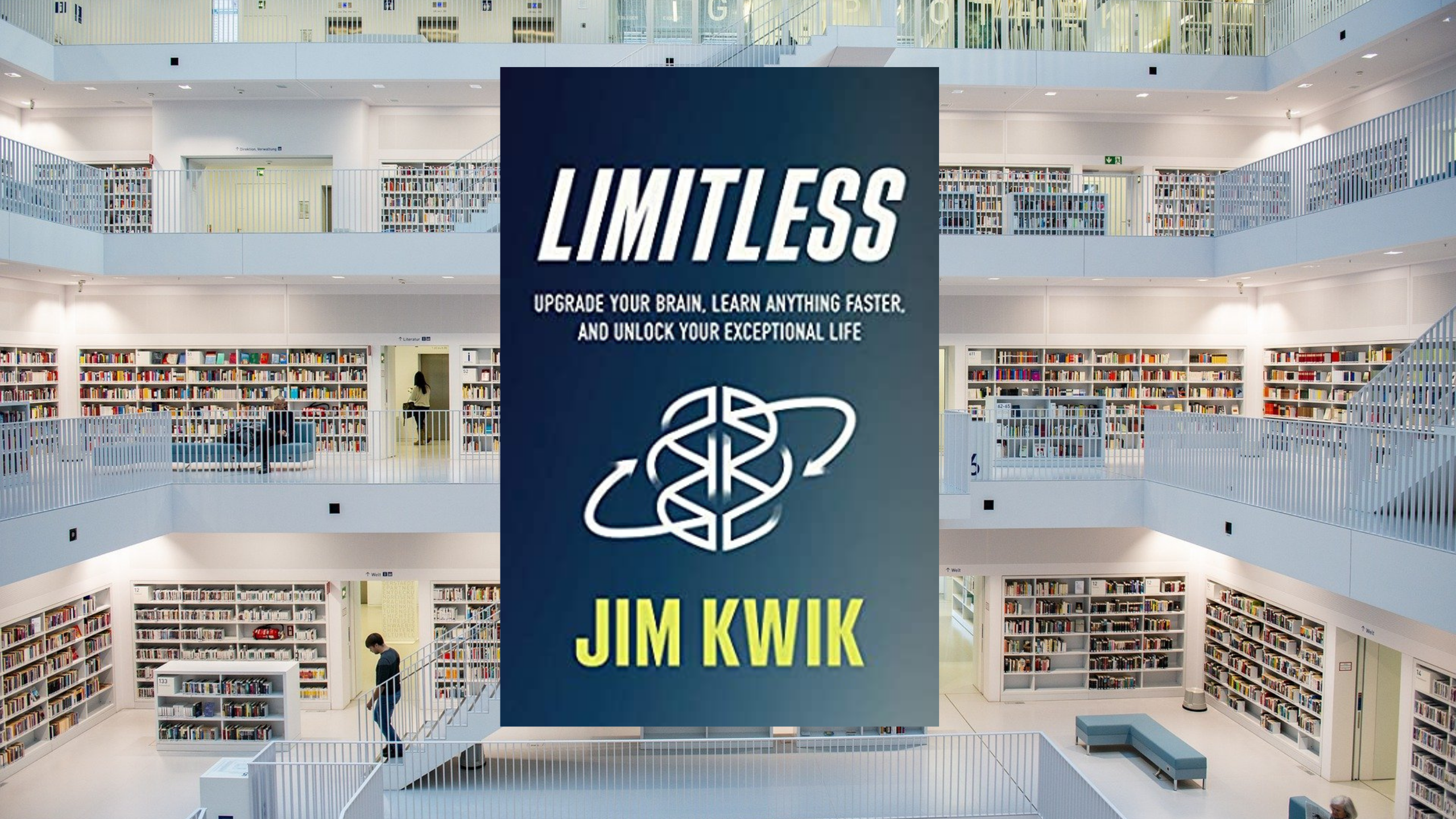
Limitless, by Jim Kwik:
Jim Kwik is a rockstar in the self-improvement genre - the dude has tons of enthusiastic endorsements on his website by all these wildly smart and successful people - and he’s got a 25-year track record of teaching at every big company you’ve ever heard of, not to mention his podcast which has been downloaded tens of millions of times. The guy knows a thing or two about a thing or two, clearly.
One of the key ideas to understand here in this book is that your brain mediates your entire experience of reality! Everything you’ve ever seen, thought about, imagined, felt, or anything was experienced in the brain - and you only have one! Keeping your brain healthy and strong will let you do literally everything else.
Here, right at the top of your shoulders is where you need to focus all of your attention. A powerful brain will make everything else possible for you, and Limitless will show you how.
Sample Quotes from the Book:
“Most everyone limits and shrinks their dreams to fit their current reality.”
“When you teach something, you get to learn it twice.”
“Often our greatest struggles lead to our greatest strengths. My two biggest challenges as a child were learning and public speaking. Life has a sense of humor because I spend most of my life public speaking on learning.
I couldn't read, and now I teach people from all over the world how to read better. I struggled to understand my brain, and now I speak in front of audiences of thousands to help them understand the amazing tool they possess."
Read the Full Breakdown: Limitless, by Jim Kwik
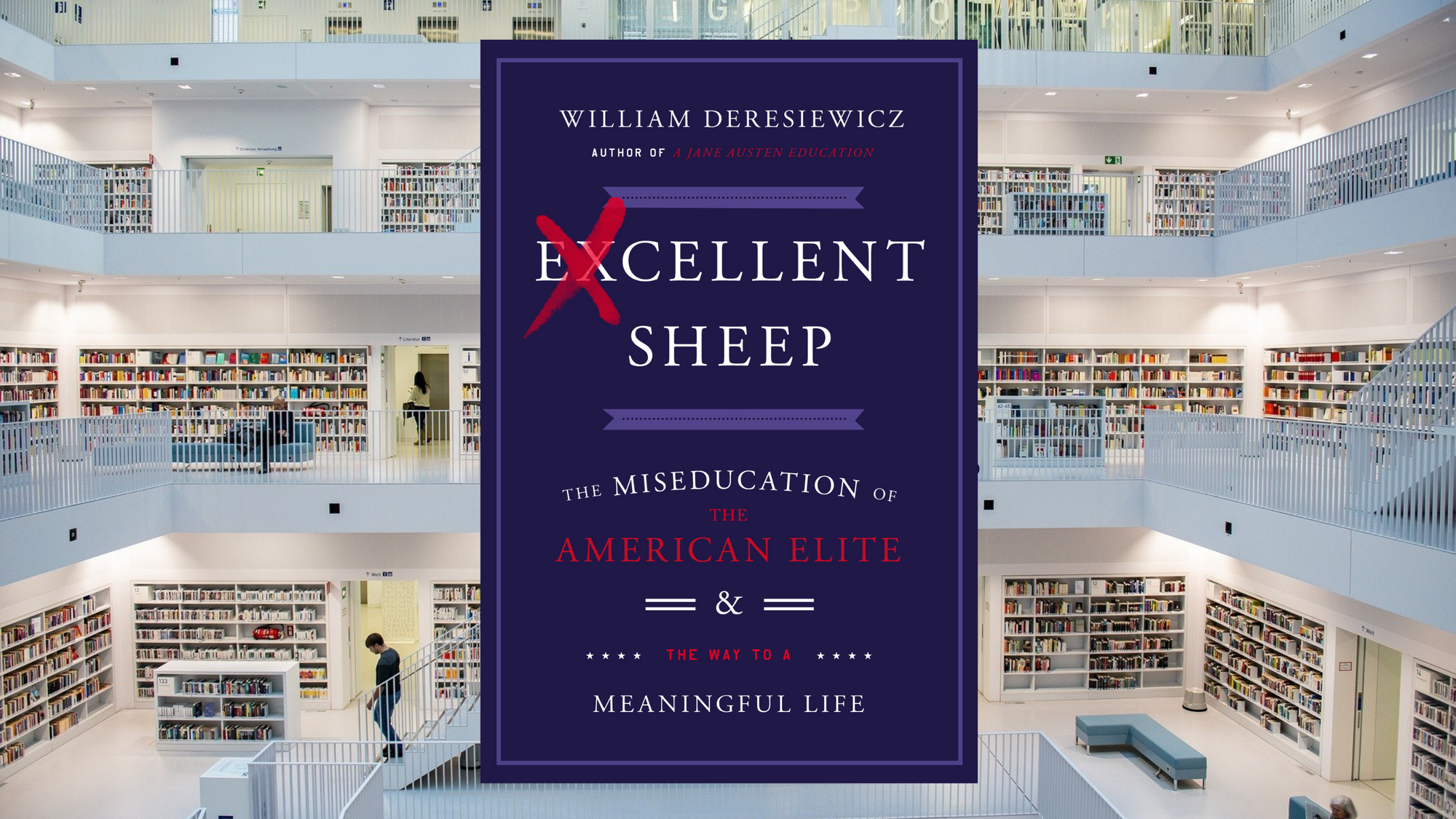
Excellent Sheep, by William Deresiewicz:
If you left university with just a degree and a pile of debt, you were robbed. Somewhere along the way, colleges and universities drifted away from being centers of higher learning and loci of self-discovery, into being commercialized profit centers, and students themselves became "customers," or, worst of all, commodities.
William Deresiewicz is a former Yale professor with a deep, infectious passion for higher education, which is self-evident throughout Excellent Sheep and which leaps from every paragraph. He cares; he cares so much, and his distress at the decline of educational standards in the United States and elsewhere is shared by myself and a multitude of other educators who know what school can really do.
Universities today often force students to choose between learning and success; the straight path to riches and prestige is prized above real education, real introspection, real meaning, and the creation of one's own real life.
In this book, Deresiewicz discusses things like the mounting stress and feelings of unworthiness faced by today's students, the history of institutions like Harvard and Yale and how their admissions standards have shifted over time, the real "return in investment" of college, the meaning of leadership, what to look for in a university, and so much more.
Sample Quotes from the Book:
“What’s the return on investment on college? What’s the return on investment of having children, spending time with friends, listening to music, reading a book? The things that are most worth doing are worth doing for their own sake.”
“The purpose of college, to put all this another way, is to turn adolescents into adults. You needn’t go to school for that, but if you’re going to be there anyway, then that’s the most important thing to get accomplished. That is the true education: accept no substitutes.
The idea that we should take the first four years of young adulthood and devote them to career preparation alone, neglecting every other part of life, is nothing short of an obscenity.
If that’s what people had you do, then you were robbed. And if you find yourself to be the same person at the end of college as you were at the beginning – the same beliefs, the same values, the same desires, the same goals for the same reasons – then you did it wrong. Go back and do it again.”
“This is your shot. This is your chance to become, not the person that you want to be, not the person you’ve decided that you’re going to be, but the person that you never could have dreamed of being.”
Read the Full Breakdown: Excellent Sheep, by William Deresiewicz
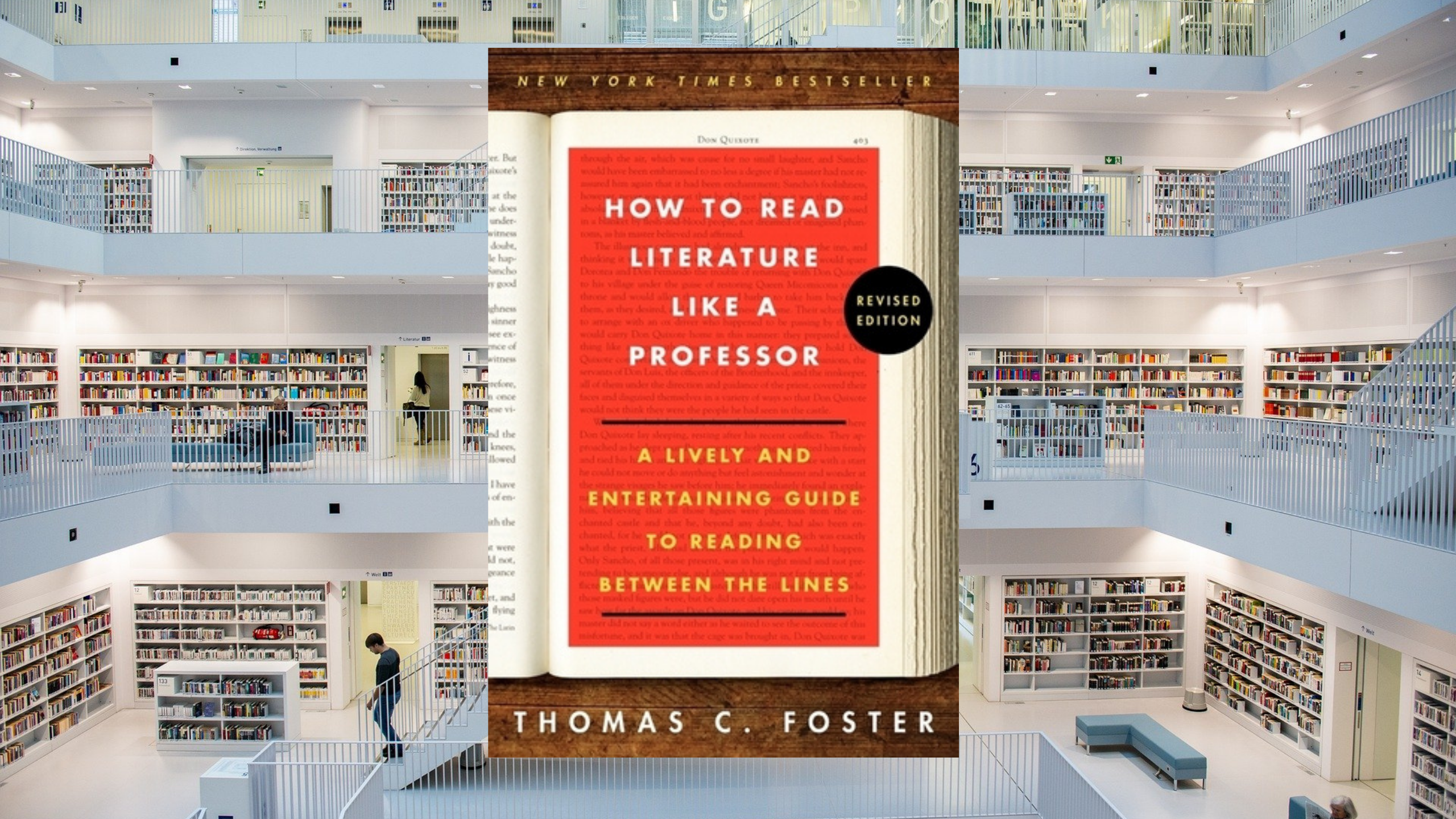
How to Read Literature Like a Professor, by Thomas C. Foster:
Dr. Foster is pretty much a composite of all the professors I loved most while in university, and he never once makes you feel - or ever tries to make you feel - dumb for not having read Jane Austen, King Lear, or whatever else.
Everyone starts where they are, and his democratizing view of literature and his emphasis that it’s for everybody struck me as a message that deserves a huge audience.
If you’ve ever felt like certain classics were “above you” (a ridiculous notion), or that you didn’t have the ability to read more challenging books, Dr. Foster and I are here to tell you that you’re smarter than you think you are, the world of books and literature is warm and welcoming, and that you should grab your library card and dive right in.
Sample Quotes from the Book:
“If the story is good and the characters work but you don't catch allusions and references and parallels, then you've done nothing worse than read a good story with memorable characters."
“When in doubt, it’s from Shakespeare.”
“Reading is a full-contact sport.”
Read the Full Breakdown: How to Read Literature Like a Professor, by Thomas C. Foster

The View from the Opposition:
No one's ideas are beyond questioning. In this section, I argue the case for the opposition and raise some points that you might wish to evaluate for yourself while reading this book.
#1: The Science of Successful Learning is Still Developing
It's highly unlikely that any of the key concepts and fundamental principles in this book will be completely overturned by later advances in science, but Make It Stick did come out in 2014, and our knowledge of how learning happens in the brain is accelerating rapidly.
That being said, I wouldn't be surprised if an updated version of this book comes out in the future, including some discussion about the nuances of successful learning in light of later advances.
Use this book as a keystone of your learning and studying practice, but be prepared to update your beliefs and knowledge as science improves. And certainly, the authors of Make It Stick would agree!
"The test of a first-rate intelligence is the ability to hold two opposed ideas in the mind at the same time and still retain the ability to function.”
-F. Scott Fitzgerald

Questions to Stimulate Your Thinking:
When you read a text or study lecture notes, pause periodically to ask yourself questions like these, without looking at the text:
"What are the key ideas?"
"What terms or ideas are new to me? How would I define them?"
"How do the ideas relate to what I already know?"
"What does this remind me of that I can use later to help me remember?"
"When will I use this information in the real world?"
"What is the author trying to say?"
"Do I agree with what the author is trying to say?"
"How can I explain these ideas to someone else?"

Action Steps:
So you've finished reading. What do you do now?
Reading for pleasure is great, and I wholeheartedly support it. However, I am intensely practical when I'm reading for a particular purpose. I want a result. I want to take what I've learned and apply it to my one and only life to make it better!
Because that's really what the Great Books all say. They all say: "You must change your life!" So here, below, are some suggestions for how you can apply the wisdom found in this breakdown to improve your actual life.
Please commit to taking massive action on this immediately! Acting on what you've learned here today will also help you solidify it in your long-term memory. So there's a double benefit! Let's begin...
#1: Try to Remember Everything You've Read in This Breakdown
That's right: you're going to practice "forced recall" right now! Without scrolling up for hints, think back over everything you've read so far in this breakdown and test yourself to see how much you remember.
If you get into the habit of doing this for everything that you read, you'll remember so much more than you ever have before.
#2: Stop Using Inefficient Study Strategies
As you know by now, most of what people usually do to study new information doesn't actually work all that well. It also takes a lot longer than retrieval practice, reflection, elaboration, and all the other strategies we've covered.
Thus, not only will you save time by doing less than you were doing before, you will be placing yourself at a major competitive advantage over other students, practitioners, and learners who insist on doing it the old-fashioned way.
#3: Try to Solve a Problem Before Being Taught How
We must struggle a little before being shown the answer if we want new learning to stick in our memory. In exactly the same way that we rarely appreciate "free" stuff, having everything come easy when you're studying will not lead to longer retention of the material.
Knowing this, the next time you're faced with a difficult problem or challenge, wait at least 5-10 minutes before asking for help or looking in the back of the book for the answers.
Persisting for just a few minutes longer will help you develop mental toughness for sure, but it will also prime the brain for greater retention because we remember best what we struggled most to learn.



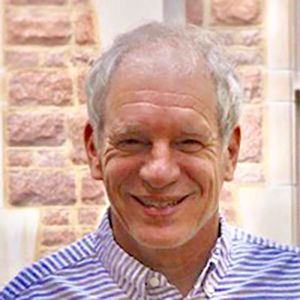
About the Authors:
Peter Brown (left) is a best-selling writer and novelist living in St. Paul, Minnesota, retired from a career as a management consultant. He is the author of five books. His work has appeared in national and international publications including The New Yorker magazine, New York Times, Times of London, Toronto Globe, Salon.com, American Public Radio, and others.
Roddy Roediger (middle) is the James S. McDonnell Distinguished University Professor at Washington University in St. Louis, and a member of the National Academy of Sciences and the American Academy of Arts and Science.
He graduated with a BA in Psychology from Washington & Lee University (1969) and received his Ph.D. from Yale University (1973) in cognitive psychology. Roediger’s research has centered on human learning and memory, and he has published over 300 articles and chapters on various aspects of cognitive processes involved in remembering.
His recent research has primarily focused on applying principles of cognitive psychology to improve learning in educational contexts, especially how testing (or retrieval practice) improves later retention. He has published three textbooks that have been through a combined total of 23 editions and he has co-edited ten other books.
Mark McDaniel (right) is a Professor of Psychology, with a joint appointment in Education, at Washington University in St. Louis. He is the founding co-director of the university’s recently inaugurated Center for Integrative Research on Cognition, Learning, and Education.
He graduated with an AB in Psychology and Mathematics from Oberlin College (1974) and received his Ph.D. from the University of Colorado (1980).
McDaniel is well-known for his work in the application of cognitive psychological principles to education. Over the past 30 years, he has published over 200 articles, chapters, and edited books in the area of human learning and memory, with numerous papers focused on applying cognition to education. He has published two books to facilitate the dissemination of research literature pertinent to memory and to cognitive aging.
Additional Resources:
Make-It-Stick.net (Main Website)
Endnotes from Make It Stick w/Commentary on Sources
Henry Roediger Speaks at Harvard About the Science of Learning
Students Should Be Tested More, Not Less - The Atlantic
How to Study: The Core Message from Make It Stick
A Mind Map Summary of Make It Stick
Retrieval-Practice.org - An Excellent Learning Resource
Extreme Memory Athlete Nelson Dellis in Action
55 Books Every Aspiring Chief Learning Officer Should Read
This Book on Amazon:
Make It Stick, by Peter C. Brown, Henry L. Roediger III, and Mark A. McDaniel
If You Liked This Book:
The Brain That Changes Itself, by Norman Doidge
Learn, Improve, Master, by Nick Velasquez
The Pleasures of Reading in an Age of Distraction, by Alan Jacobs
Moonwalking with Einstein, by Joshua Foer
Thinking, Fast and Slow, by Daniel Kahneman
Mindset, by Carol Dweck, Ph.D.
